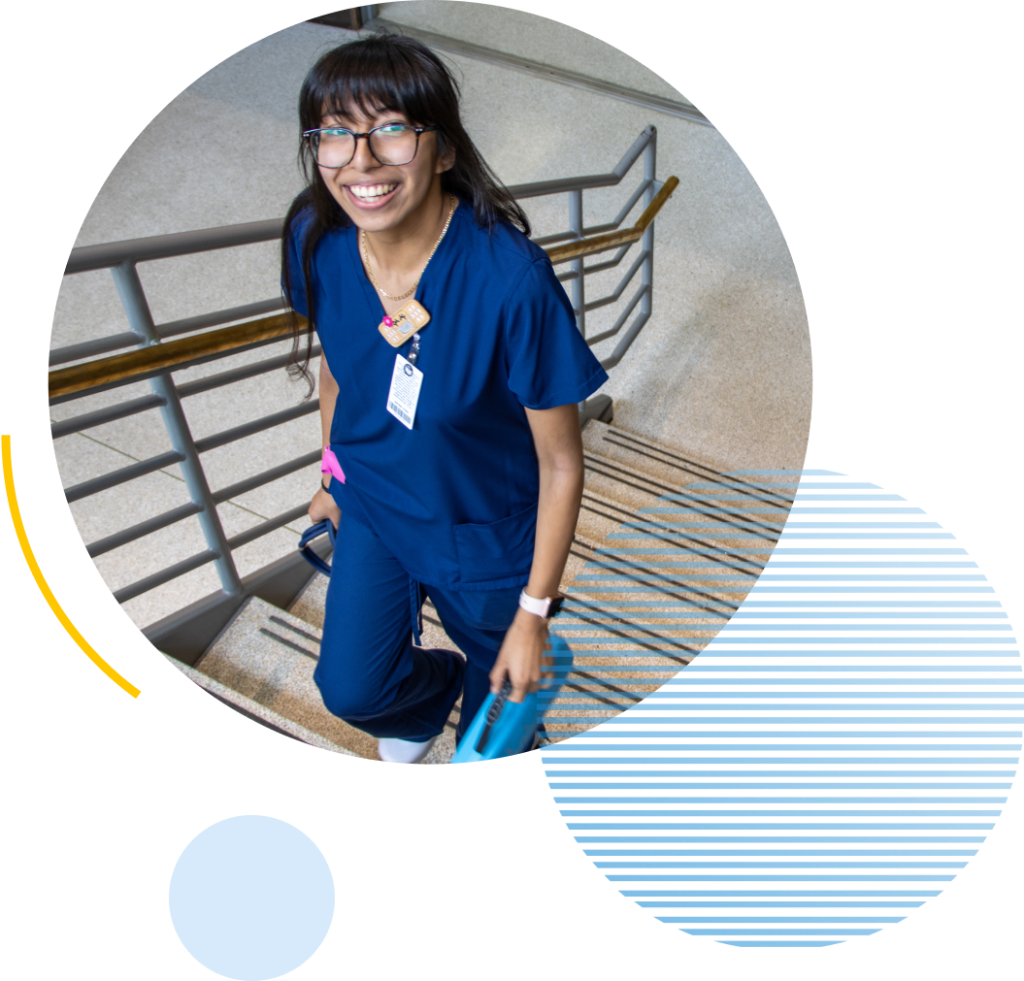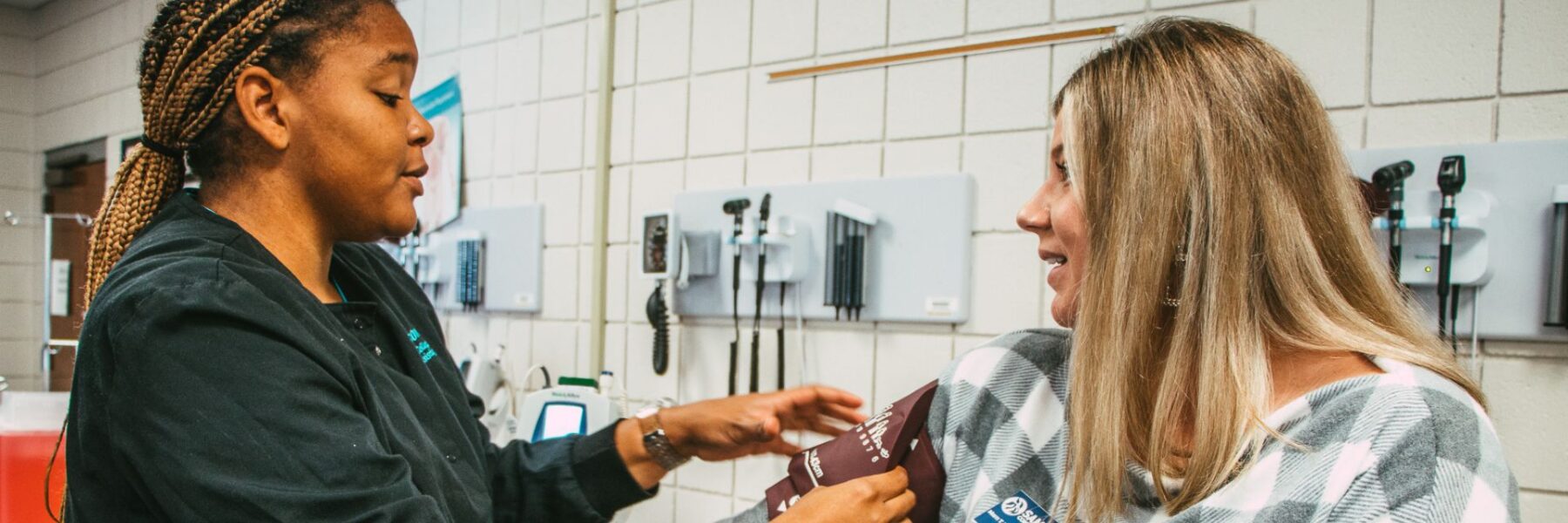Overview
The Medical Assisting curriculum prepares multi-skilled health care professionals qualified to perform administrative, clinical, and laboratory procedures.
Course work includes instruction in scheduling appointments, coding and processing insurance accounts, billing, collections, computer operations; assisting with examinations/treatments, performing routine laboratory procedures, electrocardiography, supervised medication administration; and ethical/legal issues associated with patient care.
Graduates of CAAHEP-accredited medical assisting programs may be eligible to sit for the American Association of Medical Assistants’ Certification Examination to become Certified Medical Assistants. Employment opportunities include physicians’ offices, health maintenance organizations, health departments, and hospitals.
In addition to classroom hours, students complete a 240-hour clinical practicum to be eligible for graduation. This practicum experience is one of the most beneficial components of the Medical Assisting curriculum.
85%
The Medical Assisting program at Sampson Community College has an average five-year job placement rate of 85% for the years 2018-2022.
87%
The five-year average for the exam passage rate for the years 2018-2022 is 87%.
Accreditation
The Medical Assisting Diploma Program is accredited by the Commission on Accreditation of Allied Health Education Programs(www.caahep.org) upon the recommendation of the Medical Assisting Exam Review Board.
Commission on Accreditation of Allied Health Education Programs
Commission on Accreditation of Allied Health Education Programs
9355 113th Street N., #7709
Seminole, FL 33775-7709
Phone: (727) 210-2350
Program Options
Degree (AAS)
66 credit hours
Diploma
40 credit hours
More Information
Program Goals
- Maintain a professional appearance and punctuality.
- Demonstrate a strong work ethic and legal principles in the delivery of patient care.
- Demonstrate strong critical thinking and problem-solving skills.
- Adequately perform medical administrative and clinical duties to include basic practice finances, managed care/insurance, procedural and diagnostic coding, vital signs, injections and laboratory procedures including phlebotomy.
- Adequately write and verbally communicate with patients, coworkers, and employers.
- Comply and adhere to OSHA and HIPAA standards.
- Define various medical terms, vocabulary, and abbreviations.
- List the body systems and describe the anatomy and physiology of several system organs/parts.
- Describe the Medical Assistant’s profession.
- Utilize legal terms in medical practice.
- Implement the use of medical office equipment and instruments.
- Describe and perform medical office administrative, clinical, and laboratory procedures.
- Practice safe procedures for administering medication in the medical field.
- Describe medical emergencies and pertinent first aid.
- Practice test-taking skills for examinations.
Program Outcomes
- Demonstrate professional behaviors, reflective of ethical, legal, and self-management concepts as they related to medical assisting.
- Communicate effectively and professionally with patients, their families, and other members of the health care team.
- Practice entry-level administrative, clinical, and laboratory duties, relative to the examinations and treatment of patients in medical facilities.
- Implement teaching plans based on the needs of individuals and communities.
- Describe the Medical Assistant’s profession, professional organization, and components of certification and recertification.
In addition to the program outcomes it is expected that Medical Assistants in this program will be able to:
- Explain the role of a skilled medical assistant as it relates to the performance of assigned duties under the guidance of an employing/supervising physician.
- Relate the knowledge and perform administrative and clinical techniques learned in the educational program, with a degree of competence appropriate for safe and effective office management and patient care.
- Develop a working knowledge of computing concepts, components, and basic office applications.
- Interpret verbal and written communication relevant to the safe and effective medical office and patient care practices.
- Comply at all times with legal, ethical, and professional guidelines as a health care professional.
- Develop necessary computer skills to schedule appointments, process billing, and code and process insurance accounts, and provide written documentation in the medical assisting setting.
- Apply clinical, administrative, and laboratory skills within the clinical practicum to satisfy the competency requirement for program completion.
Technical Standards
Medical Assistant duties involve cognitive, sensory, affective, and psychomotor performance requirements. Therefore, the following are examples of the kinds of activities that a student in the Medical Assisting program would be required to perform in order to successfully complete the program. The examples used are not all inclusive.
The medical assisting student must possess critical thinking skills sufficient for clinical judgment. For example, the student must be able to use critical thinking as a basis for identifying/resolving patient problems, apply knowledge from lecture, laboratory, and clinical areas, as well as utilize basic mathematical skills.
he medical assisting student should possess interpersonal skills sufficient to interact with co-workers, patients, families, and individuals from a variety of social, emotional, cultural, and intellectual backgrounds. For example, the student should be able to establish rapport with patients, families, and colleagues.
The medical assisting student must possess communication skills sufficient for interaction with others in verbal and written format. Communication abilities including speech, hearing, reading, writing, language skills and computer literacy are required. For example: Collect and document assessment data. Explain treatment procedures. Obtain and disseminate information relevant to patient care and work duties.
The medical assisting student should possess physical skills sufficient to move from room to room and maneuver in small spaces. For example: The student must be able to move around in patient rooms, work spaces, and treatment areas. Administer CPR. Transfer patients from stretchers and wheelchairs to exam table and back.
The medical assisting student should possess gross and fine motor skills sufficient to provide safe and effective care. For example, the student must be able to use equipment, administer injections, insert catheters, and other assigned duties under the supervision of the physician.
The medical assisting student should possess auditory skills sufficient to monitor and observe health needs. For example, the student must be able to hear monitor alarms, emergency signals, cries for help, and vital signs.
The medical assisting student should possess visual skills sufficient for physical assessment, performance of medical office/clinical procedures, and maintenance of environmental safety. For example: The student must be able to observe patient responses, see a change in skin color, read a scale on a syringe, monitor vital signs, read patient records, and observe color involved specimen testing.
The medical assisting student should possess the ability to perform medical office/clinical procedures. For example: Distinguish various drugs, liquids, and chemicals.
The medical assisting student should possess tactile skills sufficient to assist physician in a physical assessment. For example, the student must be able to palpate a pulse and veins for venipuncture.
The medical assisting student should present themselves in a calm and efficient manner in high stress/pressure situations with patients, staff, supervisors, and colleagues.
The medical assisting student should possess the ability to lift and carry up to 30 pounds on a weekly or daily basis. For example, the student must be able to position and transfer patients.
The medical assisting student must possess the ability to organize responsibilities, make decisions, and make accurate mathematical calculations. For example, the student must be able to evaluate patient complaints.
The medical assisting student should possess the ability to protect self and others by implementing appropriate precautions due to possible exposure to communicable disease and/or body fluids, toxic substances, and medicinal preparations. For example, the student may encounter a patient with Hepatitis B or AIDS and must be able to use standard precautions. When a health problem occurs that results in multiple absences from class, lab, or clinical or injury impedes meeting the performance standards for a period of time, the medical assisting student is required to bring documentation from the physician or other healthcare provider noting the student can safely resume activities in the program. This documentation will be used to help determine if the student can return to class, lab, and/or clinical course requirements.
Occupational Risks for Medical Assistants
Medical assistants work directly with providers and patients, with the goal of providing healthcare and ensuring patient safety. They can perform both administrative and clinical services, filling several roles in a variety of healthcare environments.
As with any healthcare profession, medical assistants are exposed to certain occupational risks and hazards while performing their duties, including the following:
Ø Exposure to infectious diseases
Ø Sharps injuries
Ø Bloodborne pathogens and biological hazards
Ø Chemical and drug exposure
Ø Ergonomic hazards from lifting, sitting, and repetitive tasks
Ø Latex allergies
Ø Stress
At the same time, there are protections set up with the Occupational Safety and Health Act (OSHA), and those protections are particularly important within a healthcare environment. OSHA has a series of standards that protect the safety of healthcare workers and patients.
As an accredited program, Sampson Community College’s Medical Assisting Program is required to teach students about the hazards that they face on the job and protocols that can be put in place to ensure workplace culture that prioritizes safety.
Help Paying for School
Students enrolling in for-credit curriculum courses can apply for multiple forms of financial assistance to help pay for school including Federal Student Aid and SCC Foundation Scholarships.


